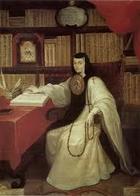
Sor Juana Inés de la Cruz (1648-1695) is the last great poet of the Golden Age of literature in Spanish. His intellectual life was very intense and encompassed all the knowledge of the time. He wrote numerous lyrical, courtly and philosophical poems, plays, religious works and Christmas carols for the main cathedrals of the Viceroyalty. Inscribed in the Baroque style, her poetry is rich in complex figures of language, ingenious concepts and references to Greco-Latin mythology.
During her life, Sor Juana's work enjoyed great popularity. Thanks to its close relations with the viceroys, it was published in Spain and read with amazement in many parts of the Empire. His poetry stands out for its dazzling sound beauty, refined wit and philosophical depth. The eighteenth and nineteenth centuries, dominated by an adverse taste for baroque aesthetics, disdained it, but in the twentieth century Sor Juana was revalued as an extraordinary classic of Hispanic literature.
In keeping with the Renaissance aesthetic of imitation, Sor Juana followed the literary models of the time and in many cases surpassed them. Examples are the poem Primero Sueño, the comedy Los empeños de una casa or the self-sacramental The Divine Narcissus, as well as the Poet's Response to the very illustrious Sister Filotea de la Cruz - normally presented as Response to Sister Filotea de la Cruz - which is one of the most important prose texts in all of New Spanish literature.




